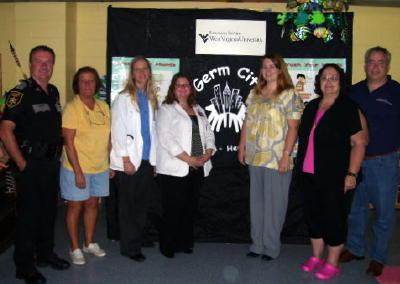
L-R: Sheriff Mickey Metz, Joyce Frashure, Amanda Burgoon
(3rd year medical student, Christina Gherke (PA student)
Jennifer Post (Extension Agent), Bessie Welch (program assistant)
and Craig Bode (4-H Program Assistant Doddridge County)
Submitted by Terri Lilly
Community Outreach-Assistant
Even though we are in the heart of summer, there are still colds and flu circulating throughout
our area.
Staff at A Small World Daycare, owned and operated by Joyce Frashure and Rose
Frashure, along with the Northern WV Rural Health Education Center (NWVRHEC) Region 2
teamed up with the West Virginia University Extension Office in hopes that some fun education
will go a long way in keeping children and staff healthy.
The WVU Extension office, represented by Jenny Post, Extension Agent, Gilmer; Bessie Welch,
Program Assistant, Gilmer; and Craig Bode, 4-H Program Assistant, Doddridge County presented
the children with Germ City: Clean Hands, Healthy People on July 22, 2008. This is a program
designed to teach children how germs move from person to person and how proper
hand washing can help prevent the spread of illness.
The Extension office was assisted by Amanda Burgoon, a medical student from WVSOM doing
her rural rotation with Dr. Hilary Miller and Christina Gherke, a PA student from AB doing her
rotation with Dr. Linnon at Gilmer Primary Care. Both students are doing their rotation through
the NWVRHEC Region 2 office.
The children were also very pleasantly surprised when Sheriff
Mickey Metz made a special visit to assist with this worthwhile endeavor. Sheriff Metz passed
out Badge stickers to all the children at the end of the program.
The children were given a "germ lotion" to show how bacteria and other germs can stick to
your hands. The ordinary lotion was given to each child to rub into their hands until it was no
longer visible. Then each child entered a small room (resembling a tent) lit by blacklights, which
let them clearly see the "germs" on their hands. Then each participant was asked to wash their
hands and return to see how many germs were still left even though they had washed. The
purpose is to show the importance of thorough hand washing and how germs can remain
behind if you don't wash properly. To learn more about Germ City, contact Jennifer Post, WVU
Extension agent, at the Gilmer County office of the WVU Extension Service at 201 N. Court
Street, Glenville, WV 2635, or call 462-7061.
The NWVRHEC would like to thank Miss Joyce and Miss Rose for the participation from A Small
World Daycare and for the hospitality shown to the students that were there to assist. Amanda
Burgoon has been on an extended rotation and has been very involved in the community.
When the NWVRHEC contacted Dr. Miller, she had the following to say about Student Dr.
Burgoon, " Student Dr. Burgoon is doing a fine job. The first rotation is always a difficult one.
Not only are you moved from an academic setting to a clinical one, but the learning experience
changes as you learn in a clinical setting. Physicians are trained by working with and emulating
more experienced physicians. This is how our profession has worked for hundreds of years. I
feel it is every physician's duty to give back and perpetuate that process by teaching. Many of
my patients enjoy the numerous students I train and it makes a more rewarding visit for the
patient because they are contributing to the learning of a future physician."
These students are required to do community service while training to be doctors, nurses,
dentists, pharmacists, physician assistants, physical therapists, dental hygienists, and
technicians. Their work in rural communities helps people learn about ways to improve their
health - engage in regular exercise, eat healthy foods, quit smoking, ATV safety, diabetes and
heart disease prevention - and a host of other health related issues.
The consortium that
covers Gilmer County is NWVRHEC, Region 2. This region also covers Wood (Williamstown),
Calhoun, Doddridge, Pleasants, Ritchie, Wirt, and Tyler. RHEC takes health science students
from different medical fields and places them in rural settings under a preceptor. The students
are required to do rural rotations before being eligible to graduate.
RHEC also provides housing
for students when necessary. Student housing is fully furnished with cable and internet
provided. The goal of the organization when bringing students into the rural areas is to retain
health care professionals to practice in medically under-served areas such as the eight counties
listed above. | 


